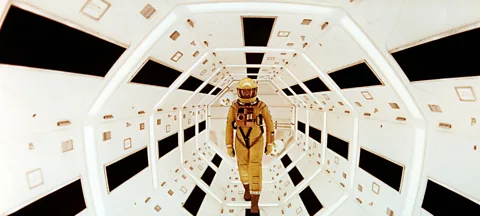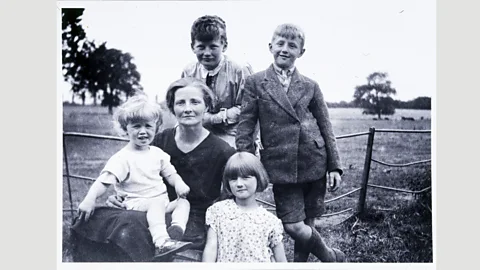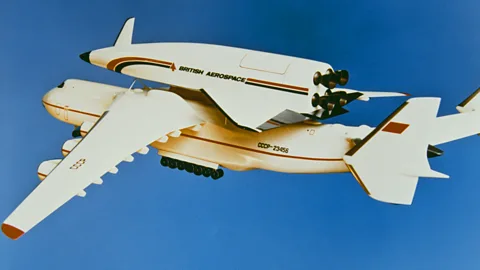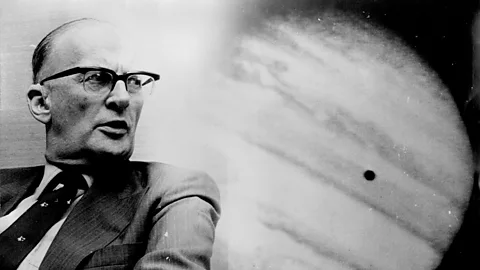The fiction that predicted space travel
 João Fazenda
João FazendaAs a scientist, many of Arthur C Clarke’s predictions for the future came true. But his wildly imaginative science-fiction writing is his greatest legacy.
Arthur C Clarke was never one to hide his light under a bushel. He referred to his office as his ‘ego chamber’ and bought an English manor house to accommodate his archives, aka the ‘Clarkives’. And yet, when it came to imagining the future, he adamantly refused to take credit for any predictions. The internet, 3D printers, email: he may have described them all long before they existed, but these were not predictions. They were, he insisted, extrapolations.
More like this:
Terminology aside, Clarke arguably did more than any other author since HG Wells and Jules Verne to catapult his mind into the future, taking a vast global readership along with him for the invariably wild ride. As a science writer, he conjured up the idea of a ‘personal transceiver’ small enough to be carried about, enabling with anyone in the world and also featuring global positioning, making getting lost a thing of the past. That essay was written back in 1959, and what he was essentially describing was the mobile phone. Just five years later, in an interview on BBC TV’s Horizon programme, he could be found contemplating telecommuting and even telemedicine. Elsewhere, he predicted everything from online banking to reusable spacecraft and the millennium bug.
Yet more than a decade after his death, it’s as an author of science-fiction that he is best ed; and his best ed fictional work of all is 2001: A Space Odyssey. The idea sprang from The Sentinel, a short story written for a BBC competition in 1948. It didn’t win, but in 1964, he and Stanley Kubrick decided to develop it simultaneously into a novel and a screenplay. It remains the definitive space film. It also happened to forecast the iPad, computer software that is able to read lips, and space stations. There’s more, too, not all of it as accurate – or at least, not yet. Space tourism? We’re getting there. Suspended animation? Let’s just say it remains highly experimental.
 Alamy
AlamyTowards the end of his life, Clarke cited 2001 as one of his most significant achievements. In its prophesying prowess, it was far from unique among his many works of fiction. For instance, his first novel, 1947’s Prelude to Space, accurately predicted the year of the first moon rocket in 1959. And a long list of inventive gadgets, gizmos and ideas that pop up in the pages of his novels and short stories begins with ‘automatic control cars’ (driverless, we call them) and runs through the alphabet to zero ‘g’, a term, if not a concept, coined by Clarke.
A Somerset farmer’s son, he was born in 1917 into a world in which sonar, crossword puzzles and bras were all relatively new-fangled inventions. His boyhood was filled with science-fiction magazines, stargazing (he made his own telescope from cardboard tubes) and fossils, a source of fascination from the moment his father gave him a cigarette card with a dinosaur on it. He had a crystal set, and his mother, who ran the local post office, taught him to tap out messages in Morse code.
He would never lose his West Country vowels, but he lost his father when he was just 13. By the time he left school a few years later, any money that might have been used to send him to university was gone. Instead, he ended up in London in 1936, working as a civil servant. By then, he was a card-carrying member of the British Interplanetary Society, a group fascinated by the idea of space travel long before it seemed realistic. He wrote for their newsletter, and contributed short stories to fanzines.
 Getty
GettyCome World War Two, he volunteered for the RAF and became an early expert in radar technology. In 1945, this work led to an article in Wireless World, in which Flight Lt Clarke showed the possibility of finding an orbit, some 23,000 miles from Earth, that would enable a satellite to remain fixed, and to transmit radio and television signals. Satellites do now circle in what’s referred to as the Clarke orbit.
After the war, a fellowship to King’s College, London led to a first in maths and physics. By the 1950s, he was publishing both fiction and non-fiction, and winning awards, too. He would be renowned for more than half a century, consulted by the scientific community and spending his days fielding correspondence from around the world. In his later years, he seemed a relic from a distant era, his tax-free Sri Lankan lifestyle ed by a staff of valets and houseboys. And then of course there were those tabloid accusations of paedophilia.
The future is fantastic
Interestingly, his vision of the future has barely aged. Indeed, some of his predictions still seem impossibly distant. For example, life in Sri Lanka inspired his 1979 novel, The Fountains of Paradise, featuring a ‘space elevator’, a planet-to-space transportation system that would do away with the need for rocket travel. Those human settlements on Mars or Venus are decidedly behind schedule (we humans were expected to have set foot on both by 1980), and we’re still looking for the key that should have fully unlocked the languages of whales and dolphins by 1970.
Being a desk-bound writer, and later confined to a wheelchair by post-polio syndrome, travel occupied him greatly. He dreamt about teleportation years before Star Trek – which he in fact inspired. He predicted the (doomed) 1980s Hotol project, which envisaged a space plane that could get from England to Australia in 48 minutes, and the altogether more successful Apollo moon landings. He also imagined machines that would convey huge loads on a cushion of air, and later bought his own hovercraft. “I thought the hovercraft would be really big. I even went out and bought one. That was a mistake. Hovercraft are wonderful over ice and excellent for military purposes, but they've not become universal in the way I thought they would,” he once told the Daily Telegraph.
 Getty
GettySo how did he do it? As he explained in that 1964 episode of Horizon: “Trying to predict the future is a discouraging and hazardous occupation.” If a prediction sounds at all reasonable, he went on, technological progress is sure to leave it seeming “ridiculously conservative”. But if, by some miracle, a person were to be able to describe the future exactly as it will unfold, “his predictions will sound so absurd, so far-fetched, that everybody would laugh him to scorn”.
irably far-fetched though many still seem, Clarke’s own ‘extrapolations’ generally ground the awesome in quotidian detail: foreseeing interstellar travel far beyond our own solar system, for instance, he took care to consider the expense of meals and in-flight entertainment. It’s a way of thinking that was likely fuelled by his inability to be anything other than utterly absorbed in all that interested him. At the very start of his career, he shared a flat on London’s Gray’s Inn Road with fellow science-fiction writers who nicknamed him ‘Ego’ because of his knack for tuning out distraction. Once he’d become a big enough name to be interviewed, he’d send journalists home laden with research papers. And while another person might have taken up scuba diving as a hobby, Clarke became so engrossed that he ended up moving to Sri Lanka where he discovered ancient underwater ruins, campaigned to protect coral reefs, and opened a diving school.
 Alamy
AlamyBeginning in childhood, he also immersed himself in his genre. As he put it in his still-startling essay collection, Profiles of the Future (published in book form in 1962): “The facts of the future can hardly be imagined ab initio by those who are unfamiliar with the fantasies of the past.” And this brings us to what surely is the real secret behind Clarke’s uncanny aptitude as a space-age seer: his imagination. To this end, though he saved his more serious prophesy for his science writing, his science-fiction writing was absolutely crucial to the process, allowing his mind to stretch far beyond the realm of what might seem immediately possible.
He once suggested that while no more than 1% of science fiction readers would make reliable prophets, almost 100% of reliable prophets will be science fiction readers – or writers. As he proclaimed back in 1962: “The one fact about the Future of which we can be certain is that it will be utterly fantastic.” It’s an oft-quoted line but it bears repeating, not least because Clarke used the word “fantastic” to capture not so much the wonderfulness of all that’s to come but its far-fetched nature.
Who knows – if we all could summon Clarke’s imaginative powers, perhaps our everyday lives would resemble the future he dreamt up still more closely.
Love reading? BBC Culture’s Textual Healing group on Facebook for more discussion about your favourite books.
If you would like to comment on this story or anything else you have seen on BBC Culture, head over to our Facebook page or message us on Twitter.
And if you liked this story, sign up for the weekly bbc.com features newsletter, called The Essential List. A handpicked selection of stories from BBC Future, Culture, Capital and Travel, delivered to your inbox every Friday.
